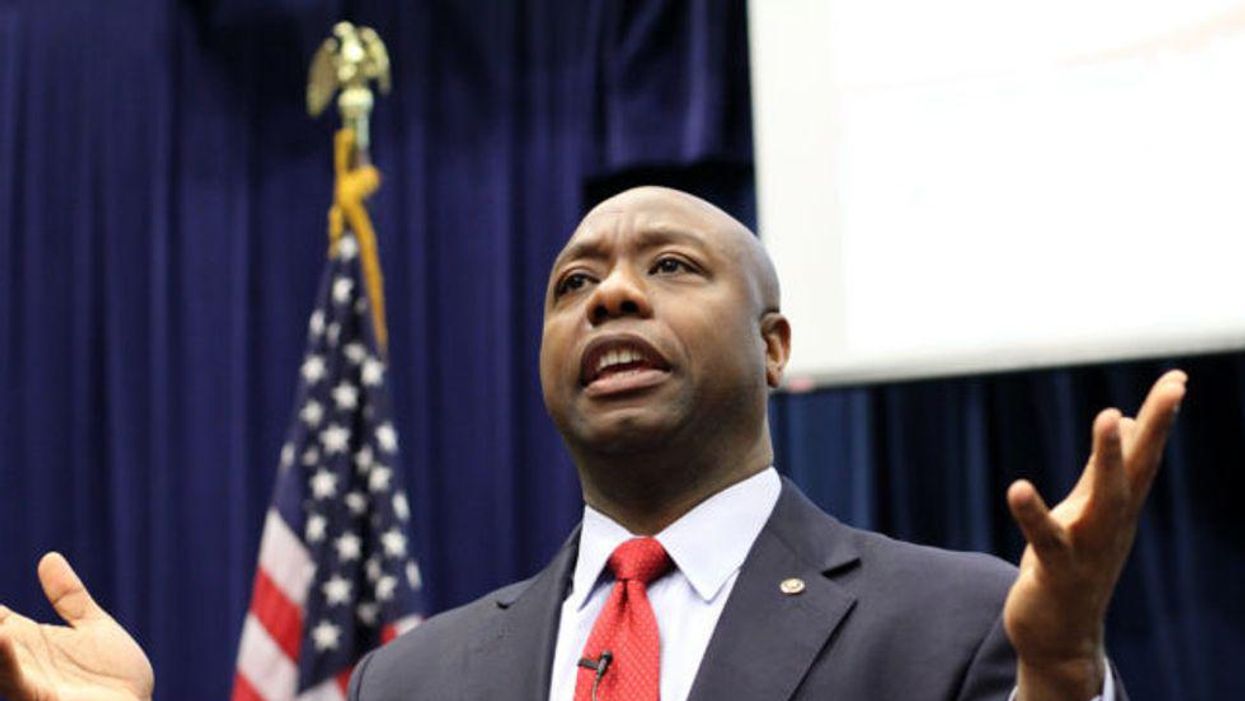Police Groups Hint Sen. Scott Lied About 'Defunding' In Reform Bill
Two of the largest police organizations in the country suggested that a Republican senator lied about negotiations over a police reform bill, which fell apart last week despite months of negotiations between Democrats and Republicans in Congress.
Sen. Tim Scott (R-SC) — the lead Republican negotiator on the failed police reform legislation — said Sunday that talks fell apart because Democrats wanted to "defund the police."
"Many provisions in this bill [Democrats] wanted me to agree to limited or reduced funding for the police," Scott said on CBS News' Face the Nation.
However, a statement released Tuesday by the International Association of Chiefs of Police and the Fraternal Order of Police said that's not true.
"Despite some media reports, at no point did any legislative draft propose 'defunding the police,'" the statement says. "In fact, the legislation specifically provided additional funding to assist law enforcement agencies in training, agency accreditation, and data collection initiatives."
The groups lamented the fact that the negotiations fell apart, writing, "It is our joint belief that the provisions under discussion would have strengthened the law enforcement profession and helped improve the state of community police engagement without compromising management and officers' rights, authorities, and legal protections."
Scott, the only Black Republican senator, had been working on the police reform bill with Sen. Cory Booker (D-NJ) and Rep. Karen Bass (D-CA) for more than a year.
The reform discussions began after George Floyd was killed by Minneapolis police officer Derek Chauvin, who has since been convicted on charges of murdering Floyd.
In June, Scott, Booker, and Bass had announced they had reached a "framework" for the reform bill but said, "There is still more work to be done on the final bill, and nothing is agreed to until everything is agreed to."
But on September 22, the talks officially broke down.
"We made it clear from the beginning of our negotiations that a bill must ensure true accountability, transparency, and the policing standards necessary to bring an end to horrific incidents of violence Americans are routinely seeing — like the murder of George Floyd," Booker said in a Sept. 22 statement. "After months of exhausting every possible pathway to a bipartisan deal, it remains out of reach right now, even after working collaboratively with and securing the support of policing groups like the Fraternal Order of Police and International Association of Chiefs of Police for our proposals."
That same day, Scott lobbed his accusation that Democrats wanted to "defund the police" and that that's why the talks fell apart.
"Despite having plenty of agreement, Democrats said no because they could not let go of their push to defund our law enforcement," Scott wrote in a September 22 statement. "Once again, the Left let their misguided idea of perfect be the enemy of good, impactful legislation."
The bill that was being negotiated, however, actually added funding for police departments for a number of things, including mental health resources for officers and data collection, according to NBC News.
The two police groups confirmed this fact in their statement.
According to CBS News, the reform bill would have:
- Banned chokeholds like the ones that led to the deaths of Floyd in Minneapolis and Eric Garner in New York City.
- Prohibited no-knock warrants like the one that led to the death of Breonna Taylor in Louisville, Kentucky.
- Tried to demilitarize local police forces that have acquired military equipment.
It's unclear what will happen with police reform now. Any legislation would need buy-in from Senate Republicans, as the filibuster remains in place and legislation needs 60 votes in order to advance. With an evenly divided Senate, 10 Republicans would have to support the legislation.
The police groups said they hope Congress can pass a bill.
"Our organizations remain steadfast in working with all interested parties who are willing to take a fact-based approach to enact effective and lasting change, to avoid a patchwork of state laws that do not provide uniform standards and guidance to the policing profession," the groups wrote in their statement.
Published with permission of The American Independent Foundation.




